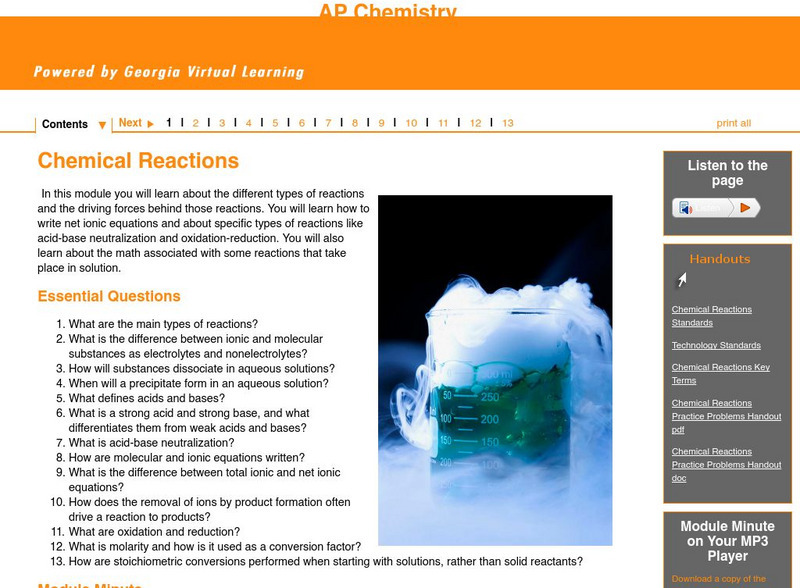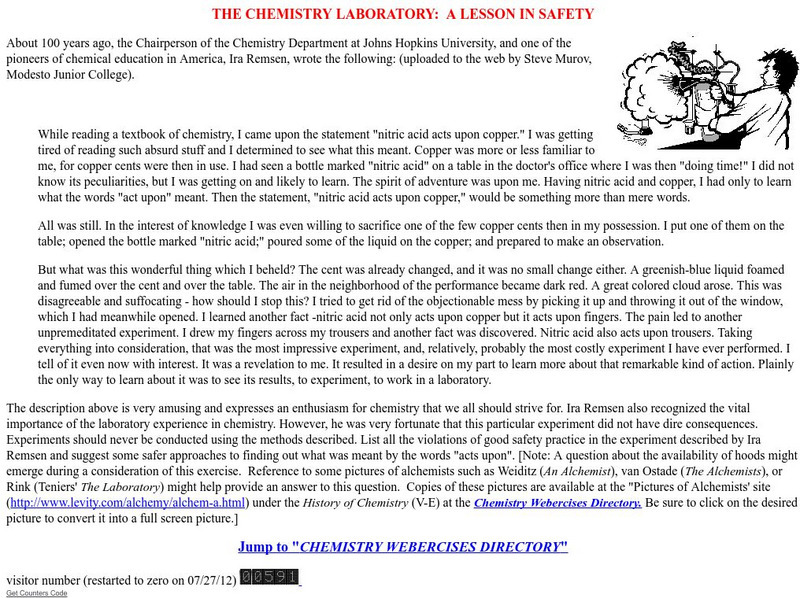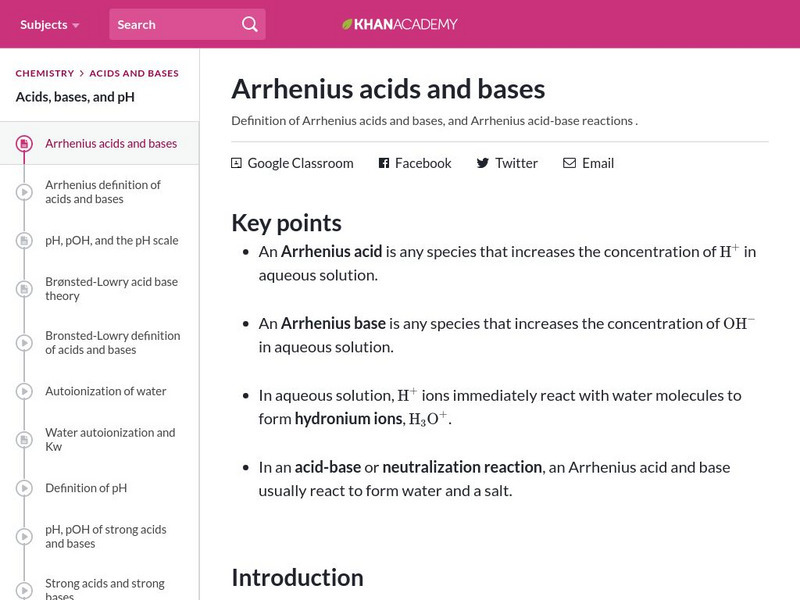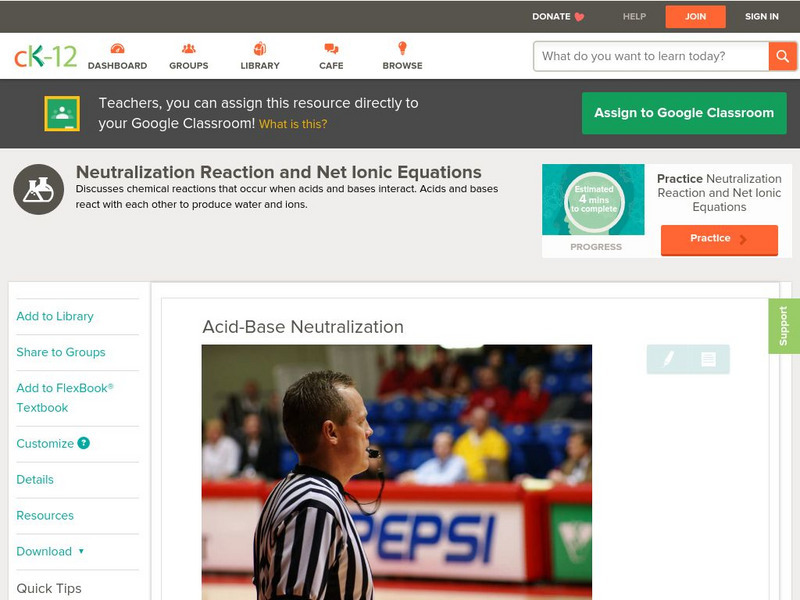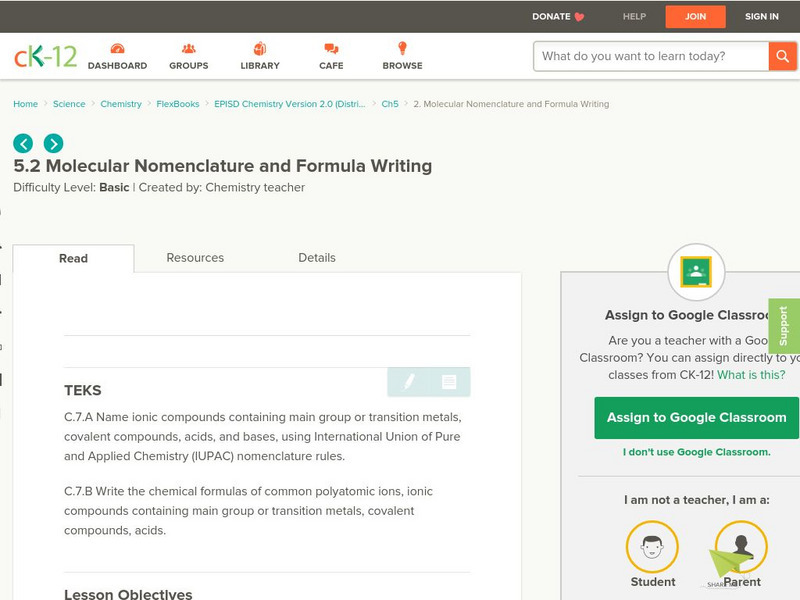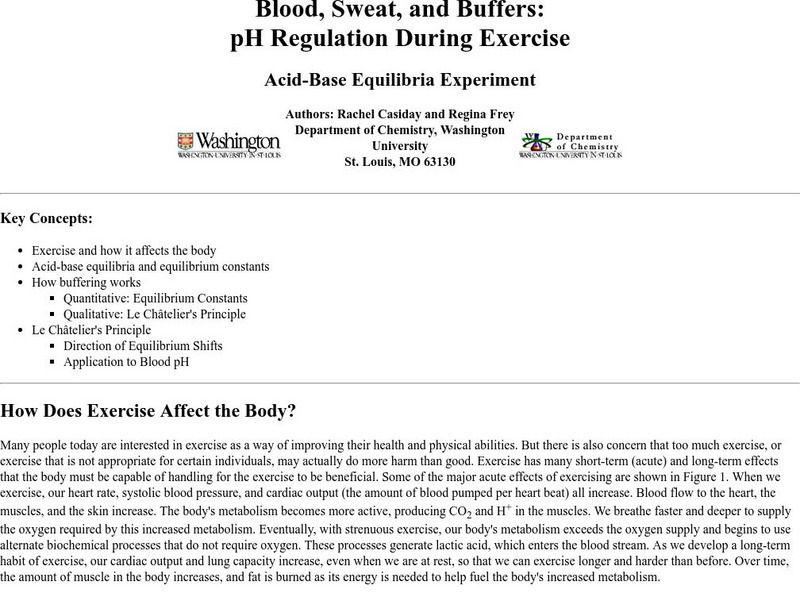Hi, what do you want to do?
Dartmouth College
Dartmouth College: Acids, Bases, and Buffers 1: Monoprotic and Polyprotic Acids
In this experiment, you will explore the behavior of the monoprotic acid (acetic acid) and the polyprotic acid (phosphoric acid). By titrating, you will examine the acid and conjugate base species present across the pH scale and the...
Dartmouth College
Dartmouth College: Chem Lab: Coordination Chemistry 3.1: Acid/base Analysis
In this experiment, you will examine the acidity of your coordination complex's water ligand. You will determine the acid dissociation constant of the complex by titrating it with a base. There are eight weeks of experiments in this series.
Carnegie Mellon University
Chem Collective: Acid Mine Drainage
Students explore the chemistry behind the causes and effects of acid mine drainage on a modeled river. In this activity, students examine the chemistry of acidic mine runoff and its effects on river water.
American Chemical Society
Middle School Chemistry: Neutralizing Acids and Bases
Young scholars will use citric acid and sodium carbonate solutions to see that adding a base to an acidic solution makes the solution less acidic. Students will then use a base to help them identify which of two acidic solutions is more...
Other
Water Resources Programme: Chemistry of Carbonic Acid in Water [Pdf]
A detailed look at carbon isotopic composition isotope and carbonic acid in water. Sections include: "Carbonic Acid Equilibria," "Carbonic Acid Concentrations," and "Closed System, Mixing of Freshwater and Seawater."
American Chemical Society
Middle School Chemistry: P H and Color Change
Students see a demonstration of a color change using universal pH indicator and then change the concentrations of an acid and a base using a universal indicator to test the pH of the resulting solutions. Through an animation, they see...
American Chemical Society
Middle School Chemistry: Carbon Dioxide Can Make a Solution Acidic
Students explain that carbon dioxide from any source reacts chemically with water to form carbonic acid. They will also be able to use the color changes of universal indicator to monitor the changing pH of a solution during a chemical...
Georgia Department of Education
Ga Virtual Learning: Ap Chemistry: Chemical Reactions
Students discover the different types of reactions, and the driving forces behind those reactions. They learn how to write net ionic equations, and learn about specific types of reactions like acid-base neutralization and...
Chemistry Collective
Chem Collective: Determine the Concentration of Acetic Acid in Vinegar
A virtual lab where students determine the concentration of acetic acid in vinegar using a 0.110 M NaOH standard solution and an acid-base indicator, phenolphthalein.
Other
The Chemistry Laboratory: A Lesson in Safety
A segment on safety in Chemistry that was written by Ira Remsen while he was at John Hopkins University.
Chiral Publishing
Chiral Publishing: An Introduction to Chemistry: Types of Compounds
Discover different types of compounds such as binary covalent, binary ionic, binary acids, and oxyacids. Explore links that give information about writing names and formulas for different compounds.
Khan Academy
Khan Academy: Arrhenius Acids and Bases
Definition of Arrhenius acids and bases, and Arrhenius acid-base reactions.
Georgia Department of Education
Ga Virtual Learning: Physical Science: Solutions Chemistry
Through interactive puzzles, informational text and video clips, students will investigate the properties of solutions.
Chemistry Collective
Chem Collective: Determine the Concentration of the Unknown Strong Acid
Perform a titration using an indicator to determine the concentration of an HCl solution.
Chiral Publishing
Chiral Publishing: An Introduction to Chemistry: Identification of Strong and Weak Bases
Read and learn about strong and weak Arrhenius bases. View the written formula and discover what certain solutions may be dissolved and which molecules can be transferred.
Science Bob Pflugfelder
Science Bob: Lemon Chemistry: An Acid Base Experiement
Science Bob presents instructions for conducting an acid-base experiment using common supplies with information on how it works.
Chem Tutor
Chemtutor: Weak Acids and Bases
For high school or college chemistry students. Discusses the use of dissociation constants to determine strength of an acid or base.
Open Curriculum
Open Curriculum: Polyprotic Acids and Bases
This article introduces how to classify acids and bases as polyprotic, as well as the properties of polyprotic acids and bases.
Open Curriculum
Open Curriculum: Monoprotic Acids and Bases
The objective of this article is to introduce how to classify acids and basic as monoprotic, and what properties these articles have.
Open Curriculum
Open Curriculum: Conjugate Acid Base Pairs
The objective of this article is to introduce conjugate pairs as a way to relate acids and bases.
CK-12 Foundation
Ck 12: Physical Science: Acid Base Neutralization
[Free Registration/Login may be required to access all resource tools.] The reaction of acids and bases and what ions are produced and the salts that form.
CK-12 Foundation
Ck 12: Ionic Compounds
[Free Registration/Login may be required to access all resource tools.] In the following online tutorial students will name ionic compounds containing main group or transition metals, covalent compounds, acids, and bases, using...
CK-12 Foundation
Ck 12: Molecular Compounds
[Free Registration/Login may be required to access all resource tools.] In the following online tutorial students will name ionic compounds containing main group or transition metals, covalent compounds, acids, and bases, using...
Other
Washington University: P H Buffers in the Blood
This site from the Department of Chemistry at the Washington University is an excellent site on how buffers are used in the human body and how they react to exercise.
Other popular searches
- Chemistry Acids and Bases
- Acid Base Chemistry
- Acid Bases in Chemistry
- Acid Base Chemistry Labs
- Review Acid Base Chemistry
- Kitchen Chemistry Acids
- Acid and Base Chemistry
- Chemistry Acid Alkali
- Ap Chemistry Acid
- Chemistry Acid Base Puzzle







